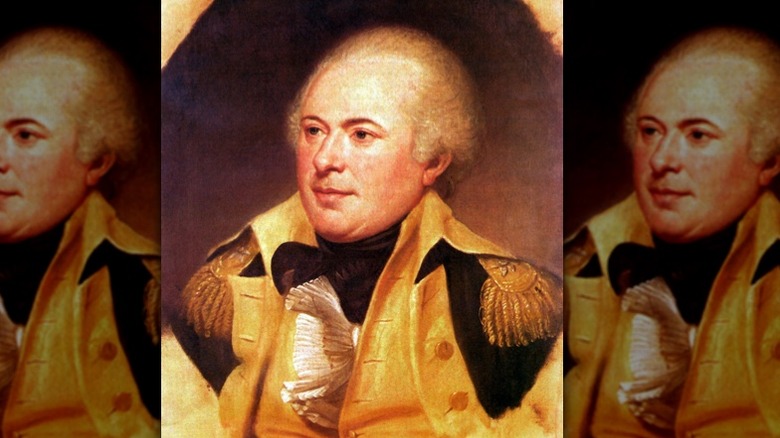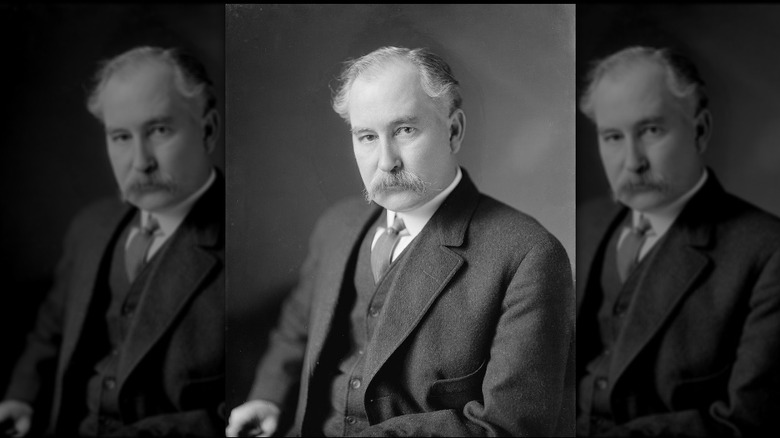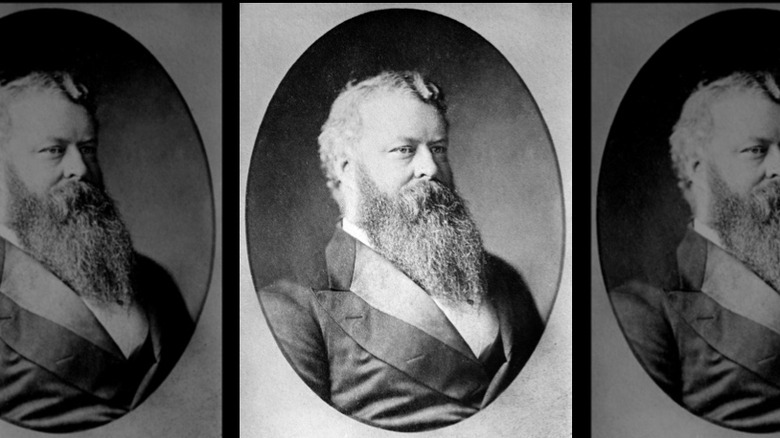Politicians Who Got Greedy, Then Lost Their Job
Holding political office gives people perks and influence, but the ability to control the destinies of others and accumulate wealth can corrupt even the best-intentioned politicians. Other times, politicians may end up in debt and simply sell their services to the highest bidder — all to maintain a lifestyle out of their financial means. And some people just like power and will do everything to increase it.
While the lust for money and power generally has ruined many a politician, lately, sex has been at the forefront. Thanks to social media, paparazzi, emails, bank records, and text messages, it has become much harder for politicians to conceal trysts with mistresses and escorts. On the flip side, some politicians have been brought down by the least of their offenses while getting away with way worse. Here are some of the American politicians who were brought down by their own greed.
William Blount
According to the Lincoln Papers, the Land Ordinance of 1785 threw open Western frontier lands to American settlement. Among the biggest land speculators in North Carolina, Kentucky, and Tennessee was William Blount. According to the North Carolina History Project, the soon-to-be Tennessee senator was a delegate at the Constitutional Convention of 1787, governor of the Tennessee Territory, and senator following the 1796 statehood. The self-interested Blount focused on protecting his vast landholdings and keeping hostile Cherokee at bay.
Blount's land speculation failed after geopolitical events crashed his holdings' values. In 1795, the United States and Spain signed the Treaty of San Lorenzo. U.S. ships would now be permitted to access New Orleans duty-free. This should have increased the lands' value, but businessmen like stability. As noted in The Journal of the Louisiana Historical Association, the Anglo-Spanish War of 1796 brought havoc to the Mississippi trading region and presumably depressed land values adjacent to the river.
Faced with ruin, Blount decided that New Orleans and Spanish West Florida would be better off under Britain rather than a declining Spain. Stable British rule would increase land prices and allow him to make a handsome profit. Thus, according to "The Spanish-American Frontier" (via the University of Chicago), Blount engineered an attempt to seize Spanish West Florida for the British. In doing so, he delayed the implementation of the Treaty of San Lorenzo and conspired against American interests with a foreign power. Interestingly, Blount was simply expelled from the U.S. Senate and went home to Tennessee, where he became a state senator.
James Wilkinson
According to NPR, James Wilkinson was an unlikely candidate for treason. Much like William Blount, the decorated Revolutionary War veteran had speculated in frontier lands that landed him in debt. So he became a Spanish spy. According to American Heritage, he drew payments of over $6,000 in silver for his services and narrowly escaped discovery on more than one occasion.
Despite the close calls, according to the TSHA, Wilkinson fell in with Jefferson White House Vice President Aaron Burr's conspiracy to detach the Louisiana Territory and Texas from the United States to form a new country. But Jefferson had also made Wilkinson the governor of the Louisiana Territory, the very area Burr wanted to seize. Per the American Conservative, Burr would seize New Orleans with Wilkinson's complicity as a staging post for an invasion of Spanish Texas.
Rumors of Burr's treason were by now circulating like wildfire in American newspapers, so Wilkinson (per The American Conservative) put on the mantle of the ardent patriot and swore to defend New Orleans with "indefatigable industry, incessant vigilance, and hardy courage." His solution? Declare martial law in the city and round up all his political enemies and their attorneys on charges of — all to cover his own involvement in the plot. It worked. Burr and Wilkinson were acquitted, but Wilkinson's abuse of power cost him his career as governor of Louisiana. Now unemployed, the old soldier returned to the army, where his poor performance in the War of 1812 cost him that job too. He went to Mexico seeking a Texas land grant but died before it was approved.
Rod Blagojevich
According to ABC 7 Chicago, Illinois holds the dubious distinction of having four of the last seven state governors serve time in prison. Three of them served time after finishing out their terms, but Rod Blagojevich allowed his greed to get the better of him while still in office. Per CNN, Blagojevich was arrested in his Chicago home on a raft of corruption charges involving pay-to-play schemes, among them the common practice of kickbacks in return for job appointments and — more controversially — attempting to sell Barack Obama's recently-vacated Senate seat in return for kickbacks and job opportunities for his wife.
The Illinois state senate impeached him and unanimously voted to remove Blagojevich from his post, allowing him to stand trial. But according to the Chicago Tribune, the first trial ended with a hung jury. Of 24 counts, he was only convicted of lying to the FBI. The second time around, despite declaring himself the victim of political persecution, the jury convicted him on 17 of 20 charges. Although an appeal saw five charges dismissed, the presiding judge sentenced Blagojevich to 14 years, which President Donald Trump commuted in 2018. The former Illinois governor is still a convicted felon, but he is no longer behind bars and lives with his wife on Chicago's Northwest Side.
Albert Fall
According to El Palacio, Albert Fall had plenty to be proud of. The self-made rancher, a darling of his constituents, was key to obtaining New Mexico statehood and became the state's first senator. But his national reputation was ruined when he was ensnared in the Teapot Dome scandal.
As the WSHS notes, the discovery of oil near the Teapot Dome rock formation in Casper, Wyoming, set off a bidding war as oilmen attempted to secure drilling rights for themselves. Under federal rules, the responsibility for the decision fell to the U.S. Navy. But Senator Fall, now the Harding Administration's Secretary of the Interior, convinced his boss to let the Department of the Interior award the contracts instead.
As it turned out, the self-interested Fall had already decided on the awardees. A handful of oilmen had bribed him $400,000 to skip the bidding process and grant them drilling rights. This is where it got interesting. The two oilmen that made the "contribution" were exonerated while Fall was convicted for taking the money from them and lying to Congress after the fact. He received one year in federal prison.
After serving his sentence, Fall returned to New Mexico, where he was still loved at home for his pro bono legal work in the years before his national political career. Nevertheless, his national reputation never recovered, and he remained in the Southwest, where he converted to Catholicism before dying in 1944.
Spiro Agnew
Richard Nixon's 1972 reelection was marred by accusations that his campaign had been involved in a break-in at the DNC headquarters in the Watergate complex in Washington, DC. The crooks attempted to wiretap Nixon's opponents, and things went from bad to worse for the embattled president when his vice president Spiro Agnew ran afoul of the IRS.
According to The New York Times, as Watergate unfolded and Nixon's future became increasingly uncertain, it was expected that Agnew would succeed him as president. So it came as a shock to the American public when the vice president pleaded no contest to a single charge of failing to report nearly $30,000 on his tax return that he had received during his tenure as governor of Maryland.
Agnew was sentenced to three years' probation and a $10,000 fine. He escaped prison thanks to Attorney General Elliot Richardson's intervention and call for leniency. Although the disgraced vice president maintained his innocence and claimed to be a victim of political prosecution, at the end of the day, it cost him his position in the White House. But according to the Concord Monitor, he got off easy. With a raft of potential corruption charges dating back to his days as a Baltimore politician, Agnew could have faced a much stiffer sentence had he been indicted for all of his misdeeds. Instead, in return for renouncing his political career, he never served a single day in prison.
William Belknap
President Ulysses Grant's ill-fated tenure was marred with numerous corruption allegations involving members of his own cabinet. The famous Whiskey Ring (via History) saw Washington politicians and cabinet members embezzle liquor taxes, while the complicated Credit Mobilier scandal (via PBS) saw legislators and Union-Pacific enrich themselves by funneling profitable railroad contracts into a shell company.
Interestingly, none of these scandals ever touched the higher-ups in the Grant administration until Secretary of War William Belknap got ahead of himself. The secretary, per the U.S. Senate, loved the high life. His luxurious parties were the talk of the DC social circuit as were his impeccably-dressed wives. The only problem? His $8,000 salary was not remotely enough to support his lifestyle.
As it turned out, Belknap had been siphoning money from the American frontier. His first wife arranged for Belknap to hand over control of a lucrative trading post out west to one Caleb Marsh. In return, Marsh kicked Belknap back over $80,000 a year (nearly $2 million today). As the House voted to impeach him, Belknap hurriedly resigned hoping to escape criminal charges but was tried before the Senate anyway for exploiting his office for personal gain. Despite overwhelming evidence, the Senate could not muster the two-thirds majority to convict, giving the disgraced secretary a providential escape with all his ill-gotten gain.
William 'Wild Bill' Langer
Republican North Dakota governor William "Wild Bill" Langer was known for being the people's governor. According to the State of North Dakota, he busted corporations as a lawyer, issued a North Dakota wheat embargo against the United States as governor to force prices up, and used the National Guard to break up farm foreclosure auctions. But according to the U.S. Senate, he also engaged in the corrupt (but then accepted) practice of taking political "contributions" out of state employees' salaries. At one point, however, per the 1934 issue of Time, he attempted to collect $179.50 from federal employees' salaries. He was hit with 1.5 years in federal prison and a $10,000 fine.
The North Dakota Supreme Court promptly removed Langer from the governorship, but true to his nickname, he refused to go quietly. He declared martial law and retained the post de facto, while Liutenant Governor Ole Olson became the de jure governor. So North Dakota had two governors simultaneously. The legislature then "impeached" Langer and acquitted him before trying to impeach the new governor Olson. But Langer could not get the quorum needed, so his partisans resorted to beating and dragging members of the North Dakota Senate into the chamber to force a quorum.
According to The Bismark Tribune, Langer won out in the end. After four trials, he was acquitted of federal charges. Unlike other aforementioned politicians, he stormed back into North Dakota politics, recapturing the governorship in 1936. Eventually, he made it to the U.S. Senate, dying in office in 1959.
Henry Newton Brown
The Wild West lived up to its name as the home to some truly corrupt and violent local politicians who abused their positions and constituents for personal gain. Law enforcers were regularly injured or killed in gunfights with outlaws and sometimes were outlaws themselves. Henry Newton Brown, the marshall of Caldwell, Kansas, was one such figure.
According to the Kansas State Historical Society, Brown was formerly a violent outlaw who had hired himself out in the Lincoln County War in New Mexico, a conflict that pitted factions of politicians, merchants, and ranchers against each other. But when he arrived in Caldwell, a rough and tumble cattle town, he used his penchant for violence to the town's benefit, clearing ruffians from the streets and making him a local hero.
For a moment, it seemed like Brown had really turned his life around. According to Richard Goodrich of Gonzaga University (via Lessons from History), he attended church, had one of Caldwell's most eligible debutantes as his wife, and was generally viewed favorably by his fellow citizens. However, Brown lived above his means. As his debts accumulated, he and three accomplices decided to rob a bank. The robbery went horribly wrong, and they shot two bank employees before being captured and jailed. His reputation in tatters, Brown wrote a heartfelt letter to his wife before an angry mob killed him inside his jail cell. Thus the man who had restored order to Caldwell met his end doing what he did best — committing crime.
Tom Garrett
Congressmen have the power to give themselves a lot of benefits, and many exploit it. The watchdog organization Open the Books enumerated the broad and generous perks that congressmen have given themselves using taxpayer money. But among the perks congressmen don't enjoy is the right to use their staffers as servants.
Virginia Republican Tom Garrett ran afoul of this ethics rule in 2018. That year, Politico broke the story that Garrett and his wife had used their staffers to perform mundane household tasks outside of work hours. In an interview with Politico, staffers mentioned that Garrett and his wife Flanna had made them dog-sit, pick up groceries, run mundane errands, and babysit and chauffeur the couple's children for up to six hours at a time.
This "effed up" situation — as one staffer called it — blew up after Garrett denied any wrongdoing, in part since the sources had spoken under the condition of anonymity. Regardless of the truth of the accusations, they were enough to ruin the freshman congressman. Per Business Insider, Garrett resigned that May, citing alcoholism and a slew of Democratic challengers before any of the allegations could be properly investigated.
If you or anyone you know is struggling with addiction issues, help is available. Visit the Substance Abuse and Mental Health Services Administration website or contact SAMHSA's National Helpline at 1-800-662-HELP (4357).
Eliot Spitzer
So far, greed and lust for power have been the driving causes of politicians' downfalls. More recently, however, thanks to tabloid newspapers, politicians' sexual escapades have increasingly brought their careers to premature ends.
According to The New York Times, Eliot Spitzer had it all. The governor of New York had won his election with nearly 70% of the vote, was happily married with three daughters, and had made his name as an anti-corruption crusader against Wall Street influence in New York politics. Per the New York Post, he was known as the "Sheriff of Wall Street." So as The New York Times reported in 2008, it came as a shock when the governor was ensnared in a federal prostitution scandal after a wiretap of his hotel room in DC revealed trysts with high-end escort Ashley Dupre.
As it turned out, per the New York Post, Spitzer had regularly paid for sex through the Emperor's Club Escort Service, doling out over $80,000 for clandestine trysts in luxury hotels in New York City, Florida, and Washington, DC. The scandal was particularly damaging to his image as a family man. Ms. Dupre, at the tender age of 22, was young enough to be Spitzer's daughter, a mere five years older than the governor's eldest daughter Elyssa. Ultimately, Spitzer resigned his post as governor and soon confessed to additional affairs. According to Politico, his wife Silda divorced him in 2015, and the former governor has avoided politics ever since.
David Petraeus
A darling of both the George W. Bush and Barack Obama administrations, General David Petraeus was widely credited among the Washington establishment of both parties as the man whose troop surge broke the back of the Iraqi insurgency following Saddam Hussein's overthrow in 2003 (per The Washington Post). In 2011, the BBC reported that Obama had made him CIA director. But he lost that position after an affair with an old flame landed him in trouble with the military and the U.S. public.
According to Time, the core of the Petraeus scandal involved the general's affair with former classmate and biographer Paula Broadwell. As Time noted, adultery is a court martial-eligible offense in the U.S. Army that can result in the loss of benefits, demotion, and prison time. While Petraeus never faced military sanctions, he flirted with gross negligence and leaking of classified information.
According to CNN, Broadwell gave a lecture that included details of the 2011 Benghazi attacks that sounded like classified information. Thus, it was assumed that "Petraeus' pillow talk" might have resulted in leaked national security information to Broadwell, who did not have the proper clearance. In the end, Congress refused to investigate, and Petraeus escaped censure on that front. But his marriage and job — not so much. His wife Holly divorced him, and he was forced to resign as CIA director. Still, unlike other politicians who have avoided the limelight following their respective scandals, Petraeus has continued to offer his views on American foreign policy, most recently regarding the conflict in Ukraine.
Robert Potter
Rounding off the list is Jacksonian Democrat Robert Potter, who got himself in hot water over power, money, and sex and somehow managed to lose his job for the least of his offenses. Per the Dictionary of North Carolina, the North Carolina politician was well-educated, well-spoken, yet rough around the edges. In one of his early runs for borough representative, he and his opponent were arrested following a brawl and attempted duel.
Potter was elected unopposed to Congress 1831. But according to a 1949 M.A. thesis from Rice University, Potter suspected two of his wife's cousins — a preacher and a 17-year-old — of sleeping with her. So the congressman castrated them both. For this, he received two years in prison and a $1000 fine but only served six months. In that time, he was also charged with libeling the sentencing judge, and his brother-in-law tried to kill him.
Somehow, Potter got elected to the North Carolina state legislature in 1834, where his run ended over some money. According to UNC, Potter lost $2,800 in a card game. Instead of conceding, he pulled out a pistol, took the money, and left. This — incredibly — is what got him expelled from the legislature, although his fellow lawmakers were likely looking for any excuse to get rid of him.
Following his divorce and expulsion from the North Carolina legislature, Potter went to Texas and died there in 1842. He contributed one word to the English language — the word "potterize," a synonym for castration. It became a capital offense in North Carolina — lest anyone else repeat the congressman's feat.












